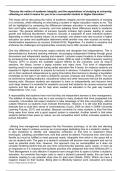“Discuss the notion of academic integrity, and the expectations of studying at university;
reflecting on what it means for you to be a successful student in Higher Education.”
This essay will be discussing the notion of academic integrity and the expectations of studying
in a university, whilst reflecting on what being a student in higher education means to me. This
will be highlighted by comparing the differences between education in secondary school/sixth
form and higher education, university, and how adapting these differences leads to academic
success. The general definition of success typically includes high grades, leading to career
growth and financial flourishment. However, success is subjective to each individual student,
depending on what the student values. As an example, one student may view success in higher
education as career and qualification attainment whilst another may view success as having a
transformative experience as success (Cottrell,2019). Regardless, if a student is receptive and
embraces the challenges and opportunities university has to offer success is attainable.
One key difference is that lectures expect maturity and alongside that independence. This is
demonstrated by lecturers teaching methods, encouraging independent thinking through group
discussions and independent reading and research. Lecturers expect students to show initiative
by accessing their sense of resourcefulness (Lizzio, 2006 as cited in Griffith University Learning
Futures, 2017) to access the available support offered by the university, such as drop-in
sessions, the library, borrow a laptop scheme and many more. This level of independent
learning would not be expected during earlier education like A levels, for instance students are
expected in higher education to prepare for lectures in advance. If students in higher education
act on their newfound independence by giving time before their lectures to develop a foundation
knowledge on the topic it can lead to academic success (Vazquez and Chiang, 2016). This can
be achieved by reading textbooks, educational videos and other resources that suit the students
learning style. Because students are expected to learn so independently and lecturers have
such large classes it is essential for academic success that students can access resources and
systems and feel able to ask for help when needed as education is the gate way towards
independence. Cho, n.d.).
A responsibility that students have now that they are independent learners is time management.
The addition of study days may be a new concept to many students that have progressed into
university. Universities will expect students to take advantage of this time accordingly, without
outside influence so students must motivate themselves. However, it is still wise that students
dedicate time to build their sense of connectedness (Lizzio, 2006 as cited in Griffith University
Learning Futures, 2017) and socialise. Because university for many students is their first time
living away from home and a good support system is essential. Another benefit is that when
students befriend their peers by nature, we are competitive which further motivates students to
pursue education.
Utilising time management techniques like the Pomodoro technique, to do lists and diarising
study times helps to achieve success as it encourages dedicating time to a student’s studies. It
is also beneficial to identify and categorise schedules to find time to implement these
techniques. Labelling committed time, time that cannot be altered. Provisional time, time that is
flexible but must be fulfilled to meet personal needs. Adaptable time which is the space left to
use as students wish. The gaps in a student’s schedule will become more apparent and can be
used as potential study time. However, this approach may be oversimplified as it does not
consider hindering factors that are very time consuming like parental, sport, career, or even as
an employee so it is important that students prioritise and categorise their time (Williams,2011).
Time Management is only effective if students have enough time to spare to further a student’s
education. As university has larger costs to meet a student’s personal needs, this can lead to
students needing to use potential study time for paid work (Weale, 2023). Which can have a
negative impact on their studies. Being able to effectively balance work, education and study
School of Health Sciences AY2021-22




